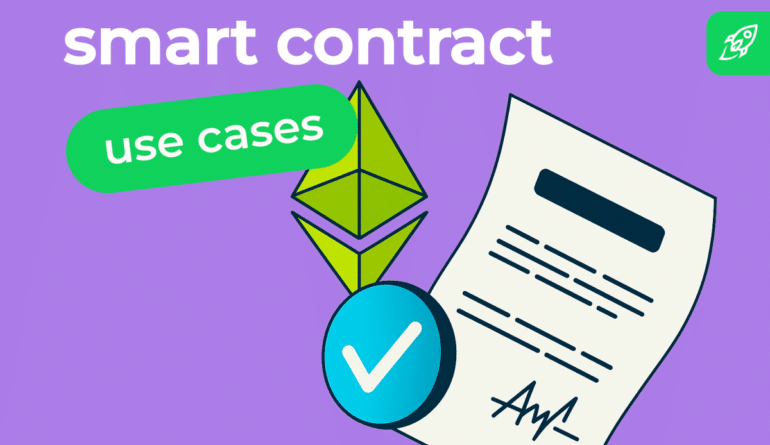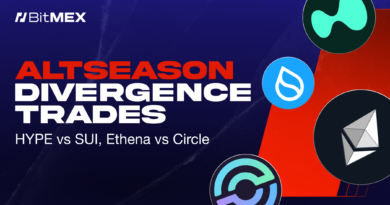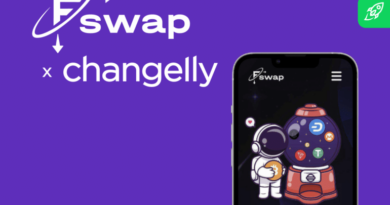17 Smart Contract Use Cases
Smart contracts used to feel like sci-fi. Today, they’re actual business tools—running payroll, processing insurance claims, and even enforcing real-estate deals. In this article, we cover practical smart contract use cases that show how the tech works in the wild. If you’re looking for examples of smart contracts making a real difference, not just theories, this is the deep dive you need.
Ready to see what smart contracts actually deliver? Let’s go.
What Are Smart Contracts?
Smart contracts are self-executing agreements with their terms written in code. They run on the blockchain, triggering actions automatically when the right conditions are met—no middlemen needed. From payments to approvals, they handle it all.

Want to dive deeper? Check out our article on smart contracts for a full breakdown.
AI & Smart Contracts
Dynamic Contract Execution
Most contracts sit still. These don’t. AI-powered contracts can react in real time. They learn from past deals, spot patterns, and adjust terms on the fly. That’s how smart contracts bring flexibility into rigid systems. Imagine a shipping contract that adapts based on traffic, demand, or weather. Using blockchain technology, it updates delivery schedules and payments automatically—no manual input needed. This shift makes contracts smarter, faster, and more responsive. For businesses, it means fewer delays and tighter control over costs.
Automated Compliance and Threat Response
AI also boosts contract security. It scans for threats and flags policy violations instantly. When a risk appears, like unauthorized access or suspicious behavior, a smart contract can respond instantly. It might freeze a transaction or log the event on a permanent ledger. That’s not just fast—it’s trusted. By automating threat response, companies cut human error and react quicker than manual teams ever could. A 2024 study showed AI-led contracts outperform manual compliance systems in both speed and accuracy. As digital assets become more common, these protections are critical.
Smart Contracts in Finance
Decentralized Finance (DeFi)
Smart contracts are at the heart of Decentralized Finance. In DeFi platforms, they automate financial operations trading without banks.
Platforms like Aave and Compound use smart contract technology to automate lending, borrowing, and yield farming. Users swap, lend, or borrow crypto through peer to peer transactions, governed entirely by code. Smart contracts now power a $130B DeFi ecosystem, with billions locked across platforms like Aave, Uniswap, and Compound. That’s real traction.
he best smart contract examples aren’t slowed down by middlemen or delays. They’re fast, secure, and execute rule-based actions instantly
Cross-Border Transactions
Wiring money across borders still feels stuck in the ’90s. Traditional financial services rely on different banks, time zones, and fees. Smart contract technology changes the game. It sends funds across the world in seconds, logs every step of the way, and removes the guesswork.
It’s already reshaping remittances and international trade, proving blockchain’s edge over traditional finance. Contracts can release payments as soon as requirements are met. That’s speed traditional systems can’t match.
Healthcare Applications
Patient Data Management
Medical data needs to be accurate, secure, and private. But fragmented systems and breaches make that hard. That’s where smart contracts can help. They create an immutable record of each update, stored on a distributed ledger. Only authorized healthcare providers can access it—and only under approved terms. This ensures accurate patient data management while locking out unauthorized users. Data can’t be changed in secret. It can be tracked and verified at every step.
Clinical Trials
Clinical data must be reliable and tamper-proof. Smart contracts make sure it is.
In clinical trials, they can log trial results as they come in, without manual handling. They also allow conditional data sharing, which means only the right researchers see sensitive info. This builds trust and speeds up research. Companies like Boehringer Ingelheim already use smart contracts to run better trials—with fewer errors and robust compliance.
Real Estate and Property Management
Property Transactions
In most cases, buying property involves piles of paperwork. Smart contracts cut through that. With real estate smart contracts, buyers and sellers automate the entire deal. Once agreed, terms execute automatically: payments, title transfers, and legal updates. This removes middlemen and delays.
The system keeps a permanent record of property ownership on-chain. It’s faster, safer, and clearer than old-school notaries—especially for digital real estate transactions on platforms like Propy or Ubitquity.
Rental Agreements
Landlords and tenants benefit from smart contracts automating rentals. They can automate tasks like rent payments, deposit refunds, and late-fee enforcement. Because smart contracts work based on pre-set terms, everyone knows what to expect.
Platforms like Rentberry use blockchain to simplify rental agreements—ensuring fairness, transparency, and faster processes. In a slow-moving industry, that’s a big step forward for modern real estate management.
Music and Entertainment
Royalty Distribution
The music industry has a payment problem. Artists often have to wait months to get paid, and middlemen take a big cut. Blockchain smart contracts clean this up.
Music tracks or videos can be tokenized on the blockchain, so that whenever they are purchased or streamed, a smart contract instantly splits and sends payments to the rights holders. Tools like Audius and Royal are already using innovative monetization models to give artists control and fans a stake. Royalty payments finally land where they belong: with the creators.
Intellectual Property Rights
Beyond music, the broader entertainment and creative industry is using smart contracts to protect intellectual property. By registering IP (art, scripts, patents, etc.) on a blockchain, creators get an immutable timestamped proof of their ownership. Creators can also register their work on-chain and set terms for use, resale, or remixing. If someone wants to use a photo or a song, they trigger the contract by paying the fee, and the license is granted without manual negotiation. Blockchain smart contracts give artists a way to protect their rights and get paid fairly. It’s a solid way to handle copyright for the Web3 era.
Supply Chains
Product Tracking
Where did that come from? Who touched it last? Supply chains often lack visibility, but blockchain networks fix that. Smart contracts log every handoff—from factory to truck to shelf. You always know what happened, when, and where.
Here’s a real world example: Australia’s winery platform Datahash uses Hedera smart contracts to trace wine provenance and thwart an estimated $3 billion in fake wine on the market. Each bottle’s data is hashed on-chain, giving buyers confidence in its origin. In pharmaceuticals, contracts track drugs from factory to pharmacy, preventing fake meds and ensuring recalls are targeted. By having an immutable audit trail, companies can quickly pinpoint issues and prove compliance to regulators.
Automated Payments
If one side ships, the other side pays—sounds simple, right? But late payments slow everything down. Smart contracts make sure parties perform before money moves. Once goods arrive and conditions are met, the payment goes out automatically. It’s fast, fair, and removes the gray area.
Maersk, one of the world’s largest shipping companies, put this into action with TradeLens, a platform built with IBM. It uses smart contracts to trigger payments as soon as shipping milestones are met—like loading cargo or clearing customs. Everything’s recorded on-chain, so there’s no need to double-check paperwork or chase invoices.
Retail and E-commerce
Vendor Management
Managing vendors across countries and platforms gets messy fast. Orders, deliveries, payments—each step involves trust and timing. Smart contracts handle this cleanly. They release payments only when the right conditions are met: goods delivered, terms matched.
Customer Loyalty Programs
Retailers like Starbucks and Lolli are already exploring blockchain-backed rewards to boost retention. Smart contracts make the math instant and the rewards fair—no fine print, no lost points.
That’s because modern rewards programs often feel like a maze: missing points, confusing rules, and limited redemption. Smart contracts simplify the whole experience. Shoppers earn points automatically and can spend them across partnered brands without friction.

Insurance
Claims Processing
Insurance claims usually mean delays, forms, and calls. Using smart contracts, insurers can automate much of this process. The moment a triggering event is verified—like a flight delay or medical bill—the payout can be processed. No need to wait for manual approval. This reduces fraud and speeds up service.
Etherisc, a decentralized insurance platform, exemplifies this with its weather-based crop insurance. By integrating smart contracts with real-time weather data, Etherisc enables automatic payouts to farmers affected by adverse weather conditions, eliminating the need for lengthy claims processes. This approach not only accelerates compensation but also enhances transparency and trust in the insurance process.
Policy Management
Tracking policies and changes manually is slow and error-prone. Digital contracts simplify this. Updates, renewals, and compliance checks can all be automated through smart contracts. They ensure coverage stays current and transparent. For low-income users or emerging markets, micro insurance solutions are also becoming possible—delivering low-cost, flexible coverage for health, travel, and assets.
Government
Land Registries
Property ownership disputes waste time and money. Governments are now testing blockchain to register land titles transparently. With an immutable ledger, anyone can verify who owns what—no paper files, no shady edits. Smart contracts could automate title transfers once legal checks are complete, ensuring quick and verified handovers.
Countries like Sweden and Georgia are already running pilot projects, using blockchain to bring trust back to public registries.
Public Procurement
Fraud in public spending is a global issue, and we can utilize smart contracts to fix it. Ukraine’s ProZorro platform, for example, improves accountability by logging every procurement step on-chain. It cuts down on red tape and boosts public trust, especially where oversight is weak.
Voting in Elections
Electronic voting is risky without transparency. But blockchain steps in to change that. By using smart contracts to manage ballots, you can validate identity claims, ensure one vote per person, and store results immutably. It’s not yet mainstream, but blockchain offers a way to build tamper-proof digital voting systems.
In 2018, the city of Tsukuba in Japan ran a blockchain local election trial, demonstrating its efficient vote counting. While challenges remain (such as ensuring voter anonymity), smart contracts show promise in making elections more accessible (e.g., remote voting) and tamper-resistant.
Additionally, recent studies suggest blockchain could cut election costs up to 90% by reducing manual processes.
Mortgages
Loan Processing
Obtaining a mortgage loan is often slow and paperwork-heavy. Blockchain changes the flow. With self-executing contracts, approvals and checks can happen automatically based on preset rules. Mortgage transactions become smoother, faster, and less prone to fraud. The full process—from application to funding—can run in digital form, cutting weeks of admin down to days.
Platforms like Figure use blockchain to speed up home loans in the U.S. Their system, called DART, runs on the Provenance blockchain. It replaces paper-heavy processes with digital records and automates every step of the mortgage flow. That means instant updates of loan ownership, fewer human errors, and lower costs.
Repayment Tracking
Missed payments create confusion for lenders and borrowers alike. Smart contracts simplify this.
They track due dates and release receipts when funds arrive. Lenders can set rules like auto-releasing property liens after the final payment. For both sides, that means fewer errors and more secure transactions.
Digital identity
Self-Sovereign Identity
With self-sovereign identity (SSI), you control your credentials—no need to rely on central platforms. Blockchain-based digital identity management lets you decide what to share, and when. Smart contracts serve as the logic layer, verifying only what’s needed without revealing everything. Projects like uPort and Sovrin make this real. And here’s why it matters: today’s digital identity systems are messy, inconsistent, and prone to leaks. SSI fixes that by putting users first.
This also helps in human resource management, where verifying resumes or certifications becomes instant and reliable.
KYC Processes
Reusable credentials. Instant checks. That’s how smart contracts streamline KYC. You verify your identity once, then reuse it wherever it’s needed—with your consent. Identity verification happens on-chain, securely and quickly.
Blockchain identity platforms like Civic, uPort, and Ontology are already putting this into practice. Users complete one KYC check, then reuse it across exchanges, wallets, or financial apps.
Recording financial data
Auditing
Traditional audits eat up time and money. Smart contracts log every transaction on a tamper-proof blockchain in real time, making it easier to verify records. For example, when a company automates invoicing, every approval and payment gets stored on-chain. At quarter-end, auditors access a complete, verified record—no chasing paperwork.
Platforms like Hedera show this cuts audit costs and errors by creating a secure environment with instantly available data. Some firms even link smart contracts to ERP systems, auto-recording expense reports and transfers. These are real use cases for smart contracts—they turn audits from a manual grind into quick, accurate analysis.
Regulatory Compliance
Smart contracts help enforce the rules before violations happen. A contract can block a trade that breaks limits, log legal ones on-chain, and let regulators access verified data in real time.
AllianceBlock uses this approach in DeFi to check if transactions comply with financial laws. In accounting, smart contracts handle tax thresholds and update rules with a simple code change.
Legal Contracts
Contract Automation
Forget reminders and follow-ups—legal contracts can now self-enforce. Platforms like Accord Project let you turn clauses like “pay in 30 days” into code. Once delivery is confirmed, the payment triggers automatically. These smart legal contracts cut delays and legal fees by turning terms into active functions. The agreement itself handles performance, holding funds or applying penalties if conditions aren’t met.
Dispute Resolution
Even with automation, disagreements happen. That’s why smart contracts often include rules for handling disputes. If a delivery’s late, the contract can freeze funds and kick off arbitration.
Platforms like Kleros let parties involved use decentralized juries, and smart contracts run the outcome—releasing funds based on the verdict.
Some traditional arbiters (AAA, ICC) are experimenting with blockchain to receive evidence and make decisions. The upshot is greater predictability and speed in resolving contract issues.

8 platforms proving smart contracts aren’t just theory.
Gaming
In-Game Asset Management
Smart contracts are changing how players own and trade in-game items. NFTs turn things like skins or weapons into unique, tradable assets. Here, smart contracts offer secure ownership, prevent tampering, and even let items move between games. Ubisoft and other game studios now use NFTs for collectibles, giving players true control. If it’s coded in, these studios can also get royalties from resales. This application of smart contracts can turn game items into real-world assets with cross-platform utility and resale value. Players gain more freedom, and studios tap into open economies.
Reward Systems
Gaming now pays—literally. In play-to-earn titles, smart contracts reward tokens for victories or quests. Tokens like SLP in Axie Infinity can be traded for income. Lotteries and prize pools also run on code, proving fairness and preventing fraud. Esports tournaments use smart contracts to collect fees and auto-pay winners. Portable badges and XP are part of this, too. All of it is built by smart contract developers ensuring consistent rewards and transparent systems. In 2025, games are mini-economies where success gets you paid.
Utilities
Energy Trading
With blockchain-based smart contracts, everyday users can sell extra solar power to their neighbors. Contracts handle matching, pricing, and payment with no middleman. These peer-to-peer setups are already live in parts of Europe and Australia. Every kilowatt sold is logged on-chain and paid out in tokens or credits. In smart grids, contracts adjust the prices based on demand—raising rates at peak times to encourage more supply. It’s greener, cheaper, and more flexible. And since contracts connect multiple parties, from homes to businesses, everyone plays a role in a cleaner energy market.
Usage Monitoring
Smart meters + smart contracts = better billing. Meters send real-time data to a blockchain, where contracts calculate and collect payments instantly. In Germany, EV stations used Ethereum smart contracts to charge by the kilowatt in real time—no invoices needed. If you save power during peak hours, the contract can auto-issue a rebate. Unusual spikes (like leaks or theft) get flagged instantly. Utilities now run smoother, fairer systems while giving users more control and fewer billing headaches.
Sustainability
Carbon Credit Management
Smart contracts are bringing transparency to carbon markets. Projects can issue tokenized credits once verified CO₂ savings are confirmed. These are recorded immutably, preventing double-counting. Platforms like Hedera Guardian use automated smart contracts to manage issuance and retirement, ensuring each credit is traceable and retired after use. Some systems link tokens to IoT sensors that track emissions and trigger credit creation when reductions hit targets. This automation and accountability help scale climate finance and prove impact in real time.
Sustainable Supply Chains
Brands are now using smart contracts to enforce sustainability from origin to destination. Each supply chain step—farm, factory, or warehouse—is logged on a blockchain. Contracts can require proof like certifications before letting products move forward. This adds trust to supply chain management and shows customers the origin of what they’re buying. Some companies go even further: if emissions exceed a set limit, the contract docks payment or auto-buys carbon offsets. By turning ESG rules into digital programs stored on-chain, firms can build streamlined global supply chains with less waste and more accountability.
Enterprise Systems
Process Automation
Smart contracts now power key business processes like payroll and invoicing. When an employee logs hours, payment is automatically executed without delays. The same goes for vendor payments: contracts trigger transfers once invoices are approved.
Companies like BASF use contracts to speed up inventory management, avoiding shortages or overstock. As a result, teams spend less time chasing approvals and more time on high-value tasks. It’s a leaner, faster way to run internal operations.
Data Integrity
Data chaos costs money. By integrating smart contracts with the blockchain, companies get one trusted record across systems. Say a sale happens: inventory, finance, and reordering all update at once. No inconsistencies, no duplicates. Every change is traceable and locked in. This prevents fraud and cuts correction time. In regulated industries, this trust layer is vital. Companies can prove data integrity at any point—because contracts keep everyone on the same page.
Why Smart Contracts Matter for Business Right Now
Smart contract applications are delivering real results in 2025. They cut costs by removing middlemen and automating workflows—researchers estimate banks could save up to $20 billion a year this way. In the insurance sector, automation and transparency may save significant amounts by reducing fraud and administrative costs. Early detection using advanced analytics could save insurers billions and act as a strong fraud deterrent.
They also boost trust and compliance. Blockchain is tamper-proof, and every step is logged. No need for manual audits or follow-ups—smart contracts enforce rules by design. Giants like IBM, Amazon, and SAP are already integrating them into their systems, signaling mainstream adoption.
In supply chains, companies report 50% fewer delays thanks to on-chain coordination. From logistics to lending, various industries are improving speed, visibility, and control. Smart contracts also power new systems like decentralized finance and tokenized rewards. For businesses looking to cut costs and move faster, the case is clear: this isn’t hype—it’s a competitive edge.
Final Words
By 2025, smart contracts have moved from theory into practice. They’re automating payments, enforcing terms, and cutting paperwork across many different sectors. The benefits are real: faster deals, fewer errors, and stronger trust.
We’ve covered how they’re transforming various industries—from gaming and healthcare to real estate and finance. If you understand the basics of blockchain, it’s time to go further. You don’t have to start from scratch—tools now make it easy to create smart contracts that fit your business.
Yes, there are still hurdles—like integration or smart contract bugs—but the upside is too big to ignore. Companies investing in smart contract development today are setting themselves up to win tomorrow. The future runs on code—and smart contracts are the upgrade that makes businesses faster, safer, and smarter.
Disclaimer: Please note that the contents of this article are not financial or investing advice. The information provided in this article is the author’s opinion only and should not be considered as offering trading or investing recommendations. We do not make any warranties about the completeness, reliability and accuracy of this information. The cryptocurrency market suffers from high volatility and occasional arbitrary movements. Any investor, trader, or regular crypto users should research multiple viewpoints and be familiar with all local regulations before committing to an investment.
The post 17 Smart Contract Use Cases appeared first on Cryptocurrency News & Trading Tips – Crypto Blog by Changelly.
Cryptocurrency News & Trading Tips – Crypto Blog by Changelly




















